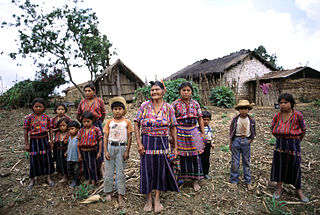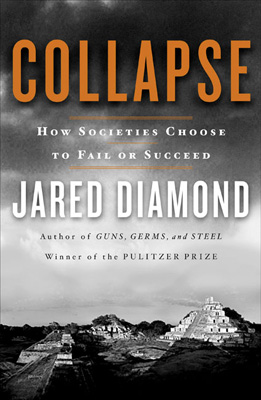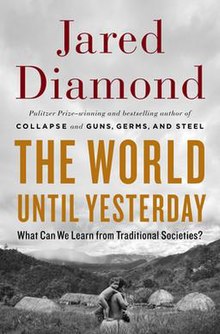
There is no generally accepted definition of Indigenous peoples, although in the 21st century the focus has been on self-identification, cultural difference from other groups in a state, a special relationship with their traditional territory, and an experience of subjugation and discrimination under a dominant cultural model.

Survival International is a human rights organisation formed in 1969, a London based charity that campaigns for the rights of Indigenous and/or tribal peoples and uncontacted peoples.

Jared Mason Diamond is an American scientist, historian, and author. In 1985 he received a MacArthur Genius Grant, and he has written hundreds of scientific and popular articles and books. His best known is Guns, Germs, and Steel (1997), which received multiple awards including the 1998 Pulitzer Prize for general non-fiction. In 2005, Diamond was ranked ninth on a poll by Prospect and Foreign Policy of the world's top 100 public intellectuals.

The Dani are an ethnic group from the Central Highlands of Western New Guinea in Baliem Valley, Highland Papua, Indonesia. Around 100,000 people live in the Baliem Valley, consisting of representatives of the Dani tribes in the lower and upper parts of the valley each 20,000 and 50,000 in the middle part. The areas west of the Baliem Valley are inhabited by approx 180,000, representatives of the Lani people, incorrectly called "Western Dani". All inhabitants of Baliem Valley and the surrounding areas are often called Dani hence they are also sometimes conflated with other highland tribes such as Lani in the west; Walak in the north; Nduga, Mek, and Yali in the south and east.

Collapse: How Societies Choose to Fail or Succeed is a 2005 book by academic and popular science author Jared Diamond, in which the author first defines collapse: "a drastic decrease in human population size and/or political/economic/social complexity, over a considerable area, for an extended time." He then reviews the causes of historical and pre-historical instances of societal collapse—particularly those involving significant influences from environmental changes, the effects of climate change, hostile neighbors, trade partners, and the society's response to the foregoing four challenges. It also considers why societies might not perceive a problem, might not decide to attempt a solution, and why an attempted solution might fail.

Edmund Wade Davis is a Canadian cultural anthropologist, ethnobotanist, photographer, and writer.

Shelton H. Davis was an American cultural anthropologist and activist for the rights of indigenous peoples. His academic and organizational work with Latin American indigenous communities contributed to the late 20th century public interest anthropology movement.

Uncontacted peoples are groups of indigenous peoples living without sustained contact with neighbouring communities and the world community. Groups who decide to remain uncontacted are referred to as indigenous peoples in voluntary isolation. Legal protections make estimating the total number of uncontacted peoples challenging, but estimates from the Inter-American Commission on Human Rights in the UN and the non-profit group Survival International point to between 100 and 200 uncontacted tribes numbering up to 10,000 individuals total. A majority of uncontacted peoples live in South America, particularly northern Brazil, where the Brazilian government and National Geographic estimate between 77 and 84 tribes reside.
The Boyer Lectures are a series of talks by prominent Australians, presenting ideas on major social, scientific or cultural issues, and broadcast on ABC Radio National.

Khonds are an indigenous Adivasi tribal community in India. Traditionally hunter-gatherers, they are divided into the hill-dwelling Khonds and plain-dwelling Khonds for census purposes, but the Khonds themselves identify by their specific clans. Khonds usually hold large tracts of fertile land, but still practice hunting, gathering, and slash-and-burn agriculture in the forests as a symbol of their connection to, and as an assertion of their ownership of the forests wherein they dwell. Khonds speak the Kui language and write it in the Odia script.

Ritual warfare is a state of continual or frequent warfare, such as is found in some tribal societies.
Millennium: Tribal Wisdom and the Modern World is a 1992 documentary television series of ten one-hour episodes celebrating the lifeways and worldviews of small scale non-technological societies as the last of them face their inevitable accommodation with the 'modern world'. The Western world's desire to remake other societies into its own image robs our modern world of the gifts of other cultures. By exploring the values and different worldviews that hold many tribal societies together, the Millennium series reflects on what the modern world can learn from tribal societies as we all face the challenges of the next millennium: harmony with the natural world and one another, humility and tolerance, and a sense of belonging.
Indigenous rights are those rights that exist in recognition of the specific condition of the indigenous peoples. This includes not only the most basic human rights of physical survival and integrity, but also the rights over their land, language, religion, and other elements of cultural heritage that are a part of their existence and identity as a people. This can be used as an expression for advocacy of social organizations, or form a part of the national law in establishing the relation between a government and the right of self-determination among its indigenous people, or in international law as a protection against violation of indigenous rights by actions of governments or groups of private interests.

New Guinea is the world's second-largest island, with an area of 785,753 km2 (303,381 sq mi). Located in Melanesia in the southwestern Pacific Ocean, the island is separated from Australia by the 150-kilometre wide Torres Strait, though both landmasses lie on the same continental shelf, and were united during episodes of low sea level in the Pleistocene glaciations as the combined landmass of Sahul. Numerous smaller islands are located to the west and east. The island's name was given by Spanish explorer Yñigo Ortiz de Retez during his maritime expedition of 1545 due to the resemblance of the indigenous peoples of the island to those in the African region of Guinea.
Traditional ecological knowledge (TEK) describes indigenous and other traditional knowledge of local resources. As a field of study in North American anthropology, TEK refers to "a cumulative body of knowledge, belief, and practice, evolving by accumulation of TEK and handed down through generations through traditional songs, stories and beliefs. It is concerned with the relationship of living beings with their traditional groups and with their environment." Indigenous knowledge is not a universal concept among various societies, but is referred to a system of knowledge traditions or practices that are heavily dependent on "place".

Johnny Nurraq Seotaituq Issaluk is an Inuk actor, athlete, and cultural educator from Nunavut. He is best known for his roles in AMC's The Terror, the film Indian Horse, and in the BBC program The Misadventures of Romesh Ranganathan. In May 2019 he was named Royal Canadian Geographical Society's Explorer-in-Residence.

Upheaval: How Nations Cope with Crisis and Change is a 2019 nonfiction book by American scientist and historian Jared Diamond. Diamond attempts to analyze devastating crises that may destroy whole countries and the multiple reasons causing them. To support his analysis with real-world examples, Diamond investigates past crises that have hit such countries as Finland, Japan, Chile, Indonesia, Germany, Australia, and the United States. Diamond also tries to understand the ways in which individuals learn to cope with personal traumas and how these approaches can be applied to nations. His unexpected conclusion is that individuals do learn from crisis but countries seldom do. He also concludes that the United States is a country in which crises are getting worse.

Green Hell is a 2019 survival video game by Creepy Jar. The game takes place in the Amazon rainforest and was released for Windows, Nintendo Switch, PlayStation 4, and Xbox One.

Highland Papua is a province of Indonesia, which roughly follows the borders of Papuan customary region of Lano-Pago, shortened to La Pago. It covers an area of 51,213.33 km2 (19,773.58 sq mi) and had a population of 1,448,360 according to the official estimates as at mid 2023.

Questioning Collapse: Human Resilience, Ecological Vulnerability, and the Aftermath of Empire is a 2009 non-fiction book compiled by editors Patricia A. McAnany and Norman Yoffee that features a series of eleven essays from fifteen authors discussing how societies have developed, evolved, and whether they have or have not collapsed throughout history, with a focus on how ancient and contemporary societies have advanced to the current global society and issues being faced in modern times. The collection of essays acts as a direct critique in the collective title and subject matter of Jared Diamond's book Collapse and, to a lesser extent, Guns, Germs, and Steel.
















